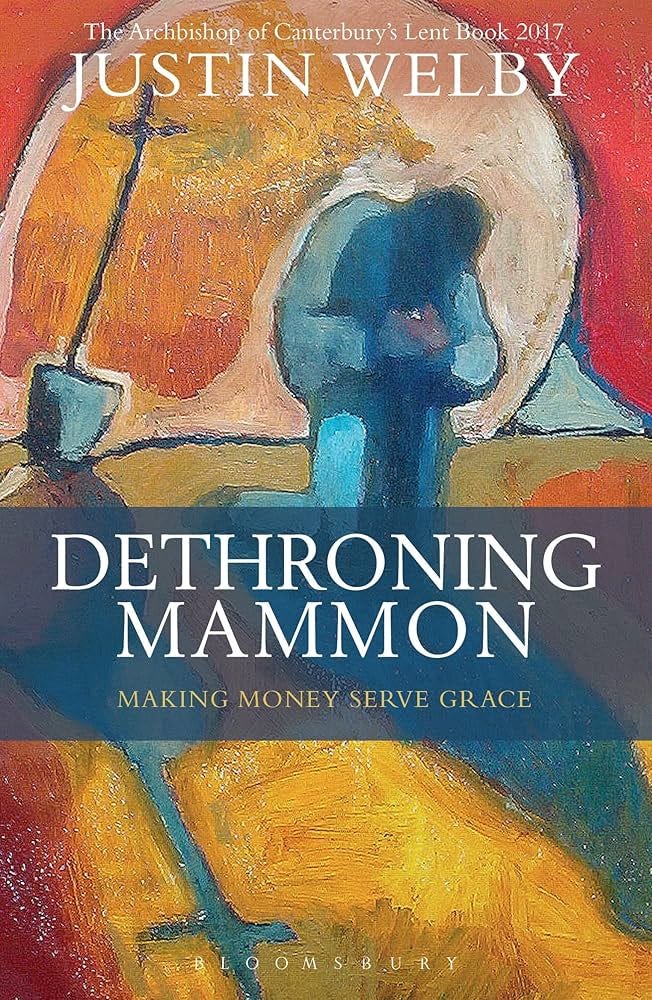Mammon and its discontents
Uh oh. All my cherished mental frameworks are paving the road to hell.
I met Justin Welby, the now or soon-to-be former Archbishop of Canterbury, at Methodist Playgroup a few weeks ago.
Not in person. Much more intimately. I found one of his books and read it.
Methodist Playgroup is a fixture on my calendar. Fortnightly on a Wednesday, my all-day-dad-day. They put on a great bash. It soaks up the morning and sets the tone for the rest of the day. Lovely warm space, a carpeted hall, with a rare low ceiling (various Churches of England also hosts enjoyable kids events near me, but always in freezing dark medieval churches cos that's what they've got). A couple of dozen kids tear around having a blast while their carers swill cups of sugary tea and natter together and facilitate the wackiness. I love it.
I don't know much about Methodists, but this lot have a wee bookshelf and a notebook with a pen tied to it with string. You can borrow the books, but not the pen. Dethroning Mammon stuck out like the proverbial dog's bollix.
I've spent much of my life trying to accumulate money, and my store of it is a key determining factor in my 'how am I doing in life?’ deliberations.
I didn't know much about Mammon. Satanish? I've heard you can't serve God and Mammon… The definition I just googled is quite good
Mammon /ˈmamən/: wealth regarded as an evil influence or false object of worship and devotion.
Ah ha! The sin of the Scrooge. Yeah, I can see how that can twist, say, rich people. But remember, by my own definition, I’m not one of those. I need a lot more cash before I feel rich enough to risk the clutches of Mammon. Or do I?
Welby reckons that Mammon can be served a lot closer to home.
He gives a more inclusive, sobering definition. Mammon expresses (him?)self in a most egalitarian way through the fixation on.
Competition, productivity, efficiency.
Fark. Fark. Fark. I thought those things were virtues. But now he says it, I can see that a myopic focus on any one of them can be pretty fatal to the spirit. They can disorder me… take my attention to a different plane - one that spends all it's time thinking about what could be, rather than what is. They divorce me from reality. That's effectively the definition of sin, by the way, for those of us who don't like that word. Sin as anti-being.
Competition, productivity, efficiency - those things are inclusive of money, but money is by no means the be-all and end-all of Mammon. Mammon is a much more cunning adversary.
But, you know, it really sucks to have one's flaws pointed out. Everyone's a critic. What's an alternative to destroying my potential for human flourishing by worshipping Mammon?
Here, Welby steps up to the plate. Forever more, when his name is mentioned, I will recall it with fondness. Welby prescribes the antidote to Mammon in two words.
Play and co-operation.
These things, you can't OD on. Within play you can find all the benefits of competition, productivity, efficiency, and perhaps their opposites. They're also the heart of scientific and intellectual enquiry, physical endeavour, music, art and everything that matters to human flourishing for both individuals and the collective.
Even writing this thing, right? I've been messing around for ages scolding myself to find a more productive writing schedule, a more efficient publishing cadence, measuring myself competitively against the success of others on this platform and beyond.
Fark that. Hopefully from now on you'll feel more play in this work. More co-operation. I am a Playwright after all. As I said in one of my notes recently
That means I'm taking the time to learn to be a better reader and sharer of other people's stuff. Encountering it for what it is, not as potential fuel for competitive similarity or difference.
Heck, we can even co-operate. Dunno how, but the first thing you could do is






Dang! is there ever a point when I will have ARRIVED? the problem with always being on a journey, is that sometimes your feet get tired.
Nicely done. Now I'm going to sit down for a moment...